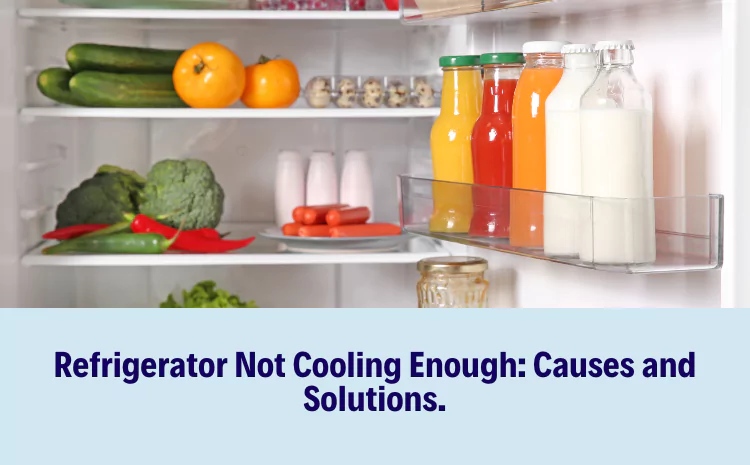A refrigerator is a staple in every household, safeguarding the quality of our food and beverages by maintaining a constant cold temperature. But what happens when your fridge isn’t cold enough?
The issue can range from simple oversights to more complex mechanical problems. This article will guide you through the most common causes of a refrigerator not being cold enough and how to repair your refrigerator so that it is back in working order once again.
Importance of a properly functioning refrigerator
The refrigerator is a cornerstone of modern living, preserving our food and keeping our drinks chilled. A properly functioning refrigerator is essential for food safety, preventing the growth of harmful bacteria that can lead to foodborne illnesses. Moreover, it helps to extend the shelf life of perishable food items, reducing food wastage and saving money.
Overview of common causes for a refrigerator not being cold enough
Several factors could be causing your refrigerator to not maintain an adequately cold temperature.
Common causes include a faulty thermostat, dirty condenser coils, blocked airflow, and insufficient refrigerant. Understanding these issues can help you identify the problem and determine whether you can handle it yourself or if it’s time to call in a professional.
Common Causes for a Refrigerator Not Being Cold Enough
Faulty thermostat
The thermostat is your refrigerator’s control center. It regulates the temperature within the appliance, triggering cooling mechanisms when the temperature rises above a set point.
However, like any other component, thermostats can malfunction over time. When this happens, your fridge may fail to cool adequately.
Dirty condenser coils
Condenser coils are an essential part of your refrigerator’s cooling system. They dissipate heat as the refrigerant passes through them. However, when these coils become covered in dust or dirt, they can’t release heat effectively, resulting in a warmer than normal refrigerator.
Blocked airflow
Airflow is crucial in maintaining a cold temperature within your fridge. The evaporator fan circulates air over the evaporator coil, cooling it down before distributing it throughout the refrigerator. If this airflow is obstructed, perhaps by overloading the fridge or blocking vents with food items, it could lead to insufficient cooling.
Insufficient refrigerant
The refrigerant is the lifeblood of your refrigerator’s cooling system. It absorbs heat from inside the fridge and releases it outside, keeping the interior cool. If there’s a leak or your refrigerator doesn’t have enough refrigerant, it may not be able to maintain a cold temperature.
Solutions to Fix a Refrigerator Not Being Cold Enough
Adjusting the thermostat
If your fridge isn’t cold enough, the first thing you should check is the thermostat. Make sure it’s set to the recommended temperature, typically around 37-40°F (3-4°C) for the fridge and 0°F (-18°C) for the freezer. If adjusting the temperature doesn’t solve the problem, the thermostat might be faulty and require replacement.
Cleaning the condenser coils
Dirty condenser coils can significantly impact your refrigerator’s efficiency. You can clean them yourself using a coil brush or vacuum cleaner. Be sure to unplug the refrigerator before cleaning for safety. Regularly cleaning the condenser coils can improve your refrigerator’s performance and extend its lifespan.
Checking and clearing blocked airflow
Ensure that there’s enough space around your food items for air to circulate freely. Try not to overfill your refrigerator, as it might block the vents and restrict airflow. Regularly organizing and cleaning your fridge can help maintain optimal airflow.
Calling a professional for refrigerant recharge or repair
If you suspect a refrigerant leak or if the issue seems beyond your expertise, it’s time to call a professional. Licensed technicians, like those at TechVill Appliance Repair Ltd., have the necessary skills and experience to safely handle refrigerant and other complex repairs. You can reach them at 1-587-316-8169 for same-day service, seven days a week.
How to Prevent a Refrigerator from Not Being Cold Enough
Regularly clean condenser coils
As mentioned earlier, clean condenser coils are critical for efficient cooling. Make it a habit to clean these coils every six months to ensure they function optimally.
Avoid overloading the refrigerator
While it might be tempting to stock up on groceries, overloading your refrigerator can obstruct airflow and strain its cooling system. Try to keep your fridge moderately filled to allow for proper air circulation.
Check and maintain proper temperature settings
Regularly monitor the temperature inside your refrigerator. Adjust the thermostat as needed to maintain the recommended temperature range. A standalone fridge thermometer can help you keep an accurate reading.
Schedule regular maintenance
Like any other appliance, your refrigerator needs regular maintenance to stay in good shape. Scheduling professional maintenance at least once a year can help identify potential issues before they become major problems.
Conclusion
A refrigerator that’s not cold enough can be a cause for concern, especially when it begins to affect the freshness and safety of your food. While some issues can be resolved easily at home, others may require professional expertise.
Understanding the common causes and knowing the solutions can help you keep your refrigerator running efficiently and maintain a safe, cold temperature for your food and beverages.
Remember, if you’re unsure or uncomfortable performing any repairs, don’t hesitate to call in a professional. Keep your refrigerator in top condition and ensure it serves you well for years to come.

Mark Thompson, a seasoned pest controller, is renowned for his expertise in keeping homes and businesses free from unwanted intruders. With a passion for environmental sustainability and a deep understanding of pest behavior, Mark has become a trusted authority in the industry.
